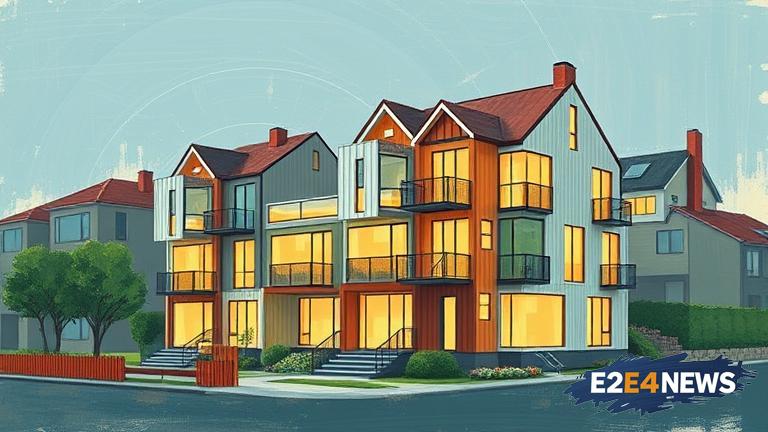The year 2025 is poised to be a transformative period for the housing industry, with a focus on innovation, sustainability, and community-driven design. According to a recent report, the housing market is expected to undergo significant changes, driven by advances in technology, shifting demographics, and evolving consumer preferences. One of the key trends shaping the future of housing is the integration of sustainable technologies, such as solar panels, green roofs, and energy-efficient systems. These innovations not only reduce the environmental footprint of buildings but also provide cost savings and improved health benefits for occupants. Another important aspect of housing innovation is the incorporation of community-driven design principles, which prioritize the needs and preferences of local residents. This approach involves engaging with stakeholders through participatory planning processes, ensuring that housing developments are tailored to the unique characteristics and requirements of each community. The report highlights the importance of affordable housing, emphasizing the need for inclusive and equitable development strategies that address the pressing issue of housing affordability. It also explores the role of modular construction, which offers a promising solution for rapidly delivering high-quality, affordable housing units. Furthermore, the report discusses the potential of emerging technologies, such as 3D printing and prefabricated construction, to revolutionize the building process and improve housing outcomes. In addition to these technological advancements, the report stresses the importance of prioritizing social sustainability, including the creation of vibrant public spaces, community facilities, and social programs that foster a sense of belonging and connection among residents. The future of housing will also be shaped by shifting demographics, including the growing demand for age-friendly and accessible housing. To address these needs, developers and policymakers must work together to create housing solutions that are adaptable, flexible, and responsive to the diverse requirements of an aging population. Moreover, the report emphasizes the need for housing developments to be resilient and adaptable in the face of climate change, incorporating design features and technologies that mitigate the impacts of extreme weather events and environmental degradation. The importance of collaboration and partnership is also highlighted, with a focus on building alliances between government agencies, private developers, and community organizations to drive housing innovation and deliver successful projects. By leveraging these partnerships, stakeholders can pool resources, share knowledge, and coordinate efforts to create housing solutions that are more effective, efficient, and sustainable. The report concludes by emphasizing the need for a comprehensive and integrated approach to housing innovation, one that balances technological advancements with social, environmental, and economic considerations. Ultimately, the future of housing will depend on the ability of stakeholders to work together to create vibrant, inclusive, and sustainable communities that meet the diverse needs of residents and promote a high quality of life. The housing industry is poised for a significant transformation, driven by technological innovation, demographic shifts, and evolving consumer preferences. As the industry continues to evolve, it is essential to prioritize sustainability, affordability, and community-driven design principles. By doing so, stakeholders can create housing solutions that are not only environmentally sustainable but also socially responsible and economically viable. The report provides a roadmap for the future of housing, highlighting the need for collaboration, innovation, and a commitment to creating thriving, resilient communities. With its focus on sustainable technologies, community-driven design, and social sustainability, the report offers a comprehensive blueprint for housing innovation in 2025 and beyond. The future of housing is likely to be shaped by a combination of technological, social, and economic factors, requiring stakeholders to be adaptable, responsive, and proactive in addressing emerging challenges and opportunities. By working together and prioritizing innovation, sustainability, and community-driven design, the housing industry can create a brighter, more sustainable future for generations to come. The report’s findings and recommendations have significant implications for policymakers, developers, and community leaders, highlighting the need for a coordinated and collaborative approach to housing innovation. As the industry continues to evolve, it is essential to stay focused on the needs and preferences of residents, prioritizing affordability, accessibility, and social sustainability in all aspects of housing development. The future of housing will depend on the ability of stakeholders to balance competing demands and priorities, creating housing solutions that are not only environmentally sustainable but also socially responsible and economically viable. By leveraging the latest technologies, design principles, and community-driven approaches, the housing industry can create thriving, resilient communities that promote a high quality of life for all residents.
